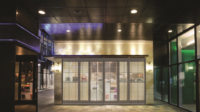The cannabis industry is growing so quickly that even COVID-19 can’t slow it down. Before the pandemic, the industry amassed $13.6 billion in U.S. legal cannabis sales in 2019 – a figure that is expected to more than double to $30 billion in the next five years, according to New Frontier Data. In states where cannabis is legal for medical or recreational use, dispensaries have been deemed necessary, essential businesses – especially when it comes to calming stress and anxiety in our ever-changing times.
Cannabis legalization and newly budding dispensaries have expanded across the U.S., which may come with an unfortunate counterpart – a higher incidence of crime. Despite lower prices in states that have legalized cannabis, as compared to states where it is still illegal, theft has run rampant across grow operations, warehouses and, most often, dispensaries.

Dispensaries can be targeted more frequently. Robbers may perceive them as an easy target, because they are businesses that have larger amounts of cash on hand. Many dispensaries only accept cash because payment processors and financial institutions aren’t willing to work with them. This is primarily because cannabis is still deemed an illegal substance under federal law, and the actions of financial institutions are governed by federal, not state, laws. Once the Secure And Fair Enforcement (SAFE) Banking Act is approved, cannabis businesses will be able to work more easily with banks, in turn reducing the amount of cash on site and erasing the dollar signs in opportunistic thieves’ eyes.
However, cash isn’t the only high thieves seek when they break into dispensaries. There’s also the product itself. Protecting it – and providing peace of mind to the facilities’ owners and occupants – is a concern for dispensaries, grow operations and warehouses. Robbers are motivated by the opportunity to make even more fast cash through reselling the product found onsite.
To eliminate such easy targets, security requirements for the cannabis industry are a necessity. They are also involved, complicated, and vary from state to state. A number of security specifications apply between state laws and local ordinances. Inventory must be properly surveilled and managed at all stages of transportation and storage. Any discrepancies in inventory can result in large fines and other penalties. To aid in understanding security compliances, the National Cannabis Industry Association (NCIA), a national trade association, recommends that start-ups obtain attorneys to guide businesses through their state’s laws and regulations.
This is why, especially for new business owners, it is critical to consider the best, most advanced security solutions – especially when it comes to doors and points of egress – that are easily integrated into buildings during the design phase. These solutions protect the products, properties, and people throughout the cannabis supply chain.
Understanding State Security Regulations
While there are no federally recognized security requirements for the cannabis industry, there are similar requirements across all states that have legalized cannabis, including:
- Maintaining strict access control throughout the facility – this is especially important for grow operations and warehouses
- Functional alarm systems
- Documented standard operating procedures
- Video surveillance systems – many states mandate very precise requirements, such as length of storage time and even video resolution specifications
- Notifying appropriate regulatory agencies immediately or within a strict timeframe after a security incident or theft
- Securing all records and record storage
While these are common, state-mandated security requirements, it is critically important to know and understand all rules, regulations, and laws concerning the industry within the business’s specific state. Making sure the business is compliant with all aspects of state laws for security and preventing violations, including the hefty financial penalties that can accompany them, is key.
States require cannabis facilities to implement sophisticated security features for several reasons. One of the most obvious is the fact that the industry supplies a high-value product and is a cash-intensive business. Integrating security features into the building can be a challenging task for architects and designers. To help tackle these challenges, manufacturers have introduced products to the cannabis industry, creating easier, more effective and aesthetically pleasing security solutions.
Integrated Designs For High Level Security
Security shouldn’t be a constraint when considering design aesthetics. Certain elements can be discretely tucked away, including cameras and security doors by way of specifying a concealed rolling door, conveniently disguised in the ceiling during operating hours. These doors can even close under alarm eliminating the need for manual intervention. Other security measures, such as bullet resistant glass, are hidden in plain sight.

Untrustworthy employees, smash-and-grab thefts or meticulously planned heists mean secure building design is of the utmost importance. In order to have the most effective security, there needs to be design vision – a clear intent for incorporating advanced security into the facility, whether visible or not.
Suggested security measures include video surveillance around the outdoor perimeter of the property as well as inside the facility. Physical barriers, such as specialized entrance locking systems – including fingerprint-scanning biometric technology – and security doors that may also include intrusion detection and automatic closure systems are recommended. All systems may be paired with 24/7 visual monitoring by security personnel.
Many state regulations also require restricted access to specific areas within dispensaries, grow operations and warehouses, with employee names and activities logged for reference. These necessary measures aid in inventory monitoring and control, further reducing the likelihood of internal theft.
When specifying building security, it’s important for architects to consider what type of building they are designing. There are differences in providing security for dispensaries versus warehouses and grow operations. Dispensaries and storefronts are frequently out in the open and in locations that are well-known to consumers. Warehouses and grow operations are usually tucked out of the way, rarely publicized, and less noticeable.
Rolling Grilles And Doors Deter Dispensary Theft
With a high-value product and cash on hand, dispensaries in particular have unique security challenges. And because they are retail businesses, egress and fire codes must be strictly adhered to, in addition to special security regulations.

In light of this, security doors require special consideration. They are necessary to provide secure protection against theft but shouldn’t distract from the architectural vision of the building or interior design.
Rolling security grilles are the ideal solution to protect the counter inside the dispensary and may also be ideal for the front of the store. They fit in small headspaces where there is limited ceiling room and can be easily concealed when not in use.
Even heavy-duty rolling doors used to protect the glass storefront of the dispensary and prevent intruders from entering the building’s dock area can be hidden when not in use. If building code allows, architects may specify a rolling door that coils up into the door’s header, residing behind an exterior soffit. These robust security doors’ lift-resistant bottom bars also can be obscured from sight.
Heavy-duty security doors at the front of the dispensary block sight access and provide a visual deterrent. They give the building a secured look when in use, but heavy-duty rolling doors don’t need to be imposing to customers during the dispensary’s operating hours.
Robust Visible Protection For Grow Operations And Warehouses
Grow operations and warehouses usually opt for more visible security doors to deter criminal activity. They also have different design considerations because of building layout and production needs. For instance, larger grow operations house plants and supplies which require heavy equipment to move throughout the facilities.

Heavy duty rolling security doors can be made with up to 12-gauge steel with interlocking slats and tamper resistant fasteners – making them stronger than standard garage doors. They provide high-end security at loading docks and limit access to restricted areas inside.
Rolling doors can also be used to block employee access to off-limits areas common in grow operations and warehouses. Because they are heavily reliant on utilities and infrastructure, such as water mains and humidity and temperature controls, warehouses and grow operations are ideal applications for rolling doors. If unauthorized personnel with ill intentions access these utility areas, it could spell disaster with ruined crops and damaged or unsafe products – turning into substantial financial losses. From a design standpoint, these doors do not need to be concealed. In fact, their visibility signals restricted access areas and hints at the security measures taken to protect these facilities.
Enhanced Security Features
Whether designing a dispensary, a grow operation facility, or a warehouse, rolling doors may be paired with automatic protection features to enhance the building’s security and help workers feel safe. These automatic closing systems allow the security doors to be immediately activated by a building alarm or the push of a panic button in emergency situations. The doors also feature advanced locking systems – some of which are hidden in non-traditional locations – providing further tamper resistance.
Some rolling door manufacturers offer in-house architectural design groups to guide architects and designers in choosing the ideal security doors. These groups can address and solve any design dilemmas that arise during the project. Every rolling door is built to a specific opening, making each product unique to that area of the project. Because of this customization, manufacturers can meet virtually any specification.
Meeting Insurance Requirements
Selecting the correct rolling door along with other advanced security features aids in meeting insurance requirements. Each insurance company has individual minimum-security conditions in its policy. Many insurance companies will not provide theft insurance if cannabis businesses do not have adequate security or cannot demonstrate they have it.
Planning Leads To Integrated Protection
The technical and legal aspects of securing dispensaries, grow operations, and warehouses can be overwhelming and, at times, confusing. Legal counsel, state agencies, industry associations, and manufacturers encourage new cannabis businesses to use them as resources as they unravel the nuances of the industry’s security regulations.
By combining robust security features such as video surveillance, proper access controls, rolling doors or grilles and automatic closure systems, cannabis facilities can meet state and insurance requirements and deter theft. With thoughtful design consideration and planning, these security features also have the capabilities to seamlessly blend with interior and exterior design aesthetics.



